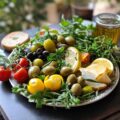The Italian lifestyle is renowned for its emphasis on balance, well-being, and a holistic approach to health. In this article, we’ll explore how you can incorporate Italian wellness practices into your daily routine to enhance your overall quality of life.
The Mediterranean Diet
One of the cornerstones of Italian wellness is the Mediterranean diet. This diet is rich in fruits, vegetables, whole grains, and healthy fats like olive oil. The Mediterranean diet is not just about food; it’s a lifestyle that includes enjoying meals with family and friends, eating slowly, and savoring each bite.
- Fruits and Vegetables: Italians consume a variety of seasonal fruits and vegetables, providing essential vitamins and antioxidants.
- Healthy Fats: Olive oil is a staple, offering numerous health benefits including heart health and anti-inflammatory properties.
- Whole Grains: Whole grains like pasta and bread are consumed in moderation and often paired with vegetables and lean proteins.
Physical Activity
Italians incorporate physical activity into their daily lives in a natural and enjoyable way. Walking is a common mode of transportation, and many Italians take evening strolls, known as passeggiata. This not only keeps them fit but also provides an opportunity to socialize and relax.
- Walking: A simple and effective way to stay active.
- Cycling: Many Italians use bicycles for commuting and leisure.
- Outdoor Activities: Hiking, swimming, and gardening are popular activities.
Social Connections
Strong social connections are a vital aspect of Italian wellness. Italians prioritize spending time with family and friends, which has been shown to improve mental health and longevity. Regular social interactions reduce stress and provide emotional support.
- Family Meals: Sharing meals with loved ones strengthens bonds.
- Community Events: Participating in local festivals and events fosters a sense of belonging.
- Friendships: Maintaining close friendships provides support and joy.
Mindfulness and Relaxation
Italians know the importance of taking time to relax and unwind. Practices like siesta (afternoon nap) and enjoying a leisurely coffee break are ingrained in Italian culture. These practices help reduce stress and improve overall well-being.
- Siesta: A short nap to recharge and improve productivity.
- Coffee Breaks: Taking time to enjoy a coffee and relax.
- Leisure Activities: Engaging in hobbies and activities that bring joy.
Work-Life Balance
Maintaining a healthy work-life balance is crucial for well-being. Italians value their free time and make sure to balance work responsibilities with personal life. This approach helps prevent burnout and promotes a healthier, more fulfilling life.
- Setting Boundaries: Clearly defining work and personal time.
- Taking Breaks: Regular breaks during the workday to rest and recharge.
- Vacation Time: Utilizing vacation days to relax and explore new places.
FAQ
1. What is the Mediterranean diet?
The Mediterranean diet is a dietary pattern that emphasizes the consumption of fruits, vegetables, whole grains, and healthy fats like olive oil. It is known for its health benefits, including reduced risk of heart disease and improved longevity.
2. How do Italians stay physically active?
Italians stay active by incorporating physical activity into their daily routines. Walking, cycling, and participating in outdoor activities like hiking and swimming are common practices.
3. Why are social connections important for wellness?
Social connections provide emotional support, reduce stress, and improve mental health. Spending time with family and friends strengthens bonds and contributes to overall well-being.
4. What is a siesta?
A siesta is an afternoon nap that helps recharge and improve productivity. It is a common practice in Italy and other Mediterranean countries.
5. How do Italians maintain work-life balance?
Italians maintain work-life balance by setting boundaries, taking regular breaks, and utilizing vacation time to relax and recharge.









